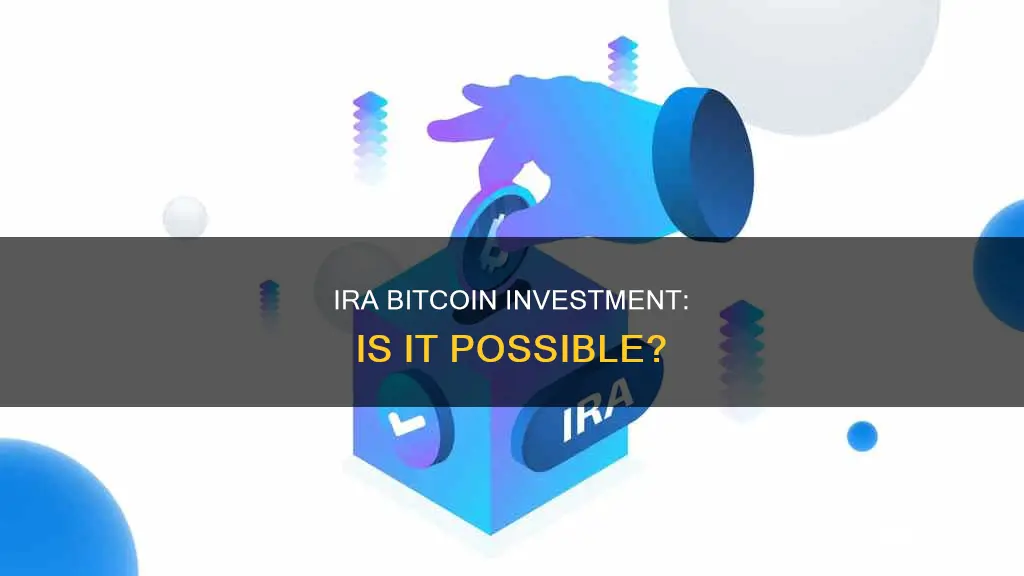
Investing in Bitcoin and other cryptocurrencies for retirement is an increasingly popular option. Bitcoin IRAs are self-directed IRAs that allow investors to hold Bitcoin and other cryptocurrencies in their retirement accounts. These accounts can provide the tax advantages of traditional and Roth IRAs, but investors need to be aware of the additional IRS rules and regulations that govern them. While Bitcoin IRAs can provide diversification and the potential for significant growth, they also come with higher fees and greater volatility compared to traditional investment options.
| Characteristics | Values |
|---|---|
| Type of IRA | Self-directed IRA |
| Investment options | Cryptocurrency, real estate, precious metals, collectables |
| Tax advantages | Same as traditional and Roth IRAs |
| Annual contribution limits | $6,500 for 2023, $7,000 for 2024, $7,500 for those 50 or older in 2023, $8,000 for those 50 or older in 2024 |
| Additional fees | Set-up fees, transaction fees, annual account management fees |
| Crypto exchange limitations | Some Bitcoin IRA companies only allow trading on affiliated currency exchanges |
| Price volatility | High |
| Tax loss harvesting | Not possible |
| Retirement planning complexity | Yes |
| Custodians | Banks, financial institutions, specialised crypto custodians |
| Secure storage solutions | Cold storage, multi-signature wallet |
What You'll Learn

Bitcoin IRA advantages
A Bitcoin IRA is a self-directed retirement account that lets you invest in cryptocurrency. It offers several advantages over traditional retirement accounts. Here are some of the key benefits:
Diversification:
Bitcoin IRAs allow you to diversify your portfolio beyond traditional stocks, bonds, and commodities. This helps protect your retirement funds from the risk of putting all your money into one asset. Additionally, Bitcoin's fixed supply means that investors' funds are not impacted by inflation.
Tax Advantages:
Bitcoin IRAs offer tax benefits similar to traditional IRAs. You only pay taxes when you sell Bitcoin at a profit. If you place your crypto in a Roth IRA, you can realize capital gains without being taxed since you already paid taxes on the funds in the account. With a regular IRA, you pay income taxes only when you make a withdrawal, which can be advantageous if your income or tax bracket is reduced after retirement.
Potential for High Returns:
Despite the volatility of the cryptocurrency market, Bitcoin IRAs offer the potential for huge gains. Investors who believe in the long-term growth of Bitcoin may find that the possibility of high returns outweighs the risks, especially if those risks are accounted for in their portfolio strategy.
Protection from Capital Gains Taxes:
Buying and selling crypto within a self-directed IRA shelters you from capital gains taxes. You are not taxed on any profits as long as the money and assets remain in your account, allowing for tax-deferred growth.
Security and Storage Solutions:
Bitcoin IRA providers typically offer secure storage solutions to protect your crypto assets from theft. These include cold storage and multi-signature wallets, ensuring the safety of your investments.
While Bitcoin IRAs offer these advantages, it's important to remember that they also come with significant risks and considerations, including market volatility, additional fees, and regulatory complexities. It's always recommended to consult a financial advisor before making any investment decisions.
Bitcoin: Should You Invest in the Crypto Craze?
You may want to see also

Bitcoin IRA disadvantages
While investing in Bitcoin for retirement can be a natural choice for cryptocurrency fans, there are several disadvantages to Bitcoin IRAs that investors should be aware of before making any decisions.
Volatility and Risk
The extreme volatility of the cryptocurrency market can make Bitcoin a challenging sell as a retirement investment. The leading cryptocurrency, Bitcoin, has experienced significant price fluctuations since 2009, going from virtually no value to highs of around $75,000. This volatility brings a substantial risk of loss, making it unsuitable for investors approaching retirement who need stable and liquid assets.
Fees
Bitcoin IRAs often come with additional fees not typically associated with traditional IRAs, including initial setup fees, custody fees, trading fees, and annual maintenance fees. These fees can be significantly higher than those of traditional IRAs and may negate the tax advantages offered.
Limited Exchange Options
Some Bitcoin IRA companies restrict investors to trading on affiliated currency exchanges, limiting their options for buying and selling crypto.
No Tax Loss Harvesting
In a taxable investment account, investors can use tax loss harvesting to offset capital gains taxes with some of their investment losses. This is not possible in a Bitcoin IRA, as there are no taxes on gains as long as the money and assets remain in the account.
Complexity
The nature of Bitcoin IRAs adds a layer of complexity to retirement planning. Investors cannot hold traditional securities like stocks and bonds in a Bitcoin IRA, so they must maintain at least one additional account for a balanced portfolio.
Early Withdrawal Penalties
Some IRA service providers may charge a penalty for withdrawing funds prematurely from a Bitcoin IRA, making it a less flexible investment option.
Custodian Challenges
Finding a custodian to manage a Bitcoin IRA can be challenging, as few traditional providers of IRAs allow for crypto investments. Additionally, investors should be cautious of scams and fraudulent companies offering custodian services.
Regulatory Considerations
The regulatory landscape for Bitcoin IRAs is still evolving, and investors should be aware of the additional IRS rules and regulations governing this type of retirement account.
Limited Contribution Amounts
Bitcoin IRAs have contribution caps, which restrict how much investors can hold in their accounts. For example, the limit for the 2021-2022 accounting year was $6,000, or $7,000 for individuals over 50 years old.
Lack of Fiduciary Duty
Custodians of self-directed accounts who permit virtual currencies as alternative assets may not owe the investor any fiduciary duty regarding these investments.
Alternative Options
Other cryptocurrencies, such as Cardano, Ethereum, and Ripple, can also be used for retirement purposes and may offer different advantages or disadvantages compared to Bitcoin IRAs.
Overall, while Bitcoin IRAs can provide tax advantages and portfolio diversification, investors should carefully consider the disadvantages and risks associated with this type of retirement account.
A Beginner's Guide to Investing in Bitcoin on Robinhood
You may want to see also

How to buy Bitcoin in an IRA
Investing in Bitcoin for retirement is a natural choice for many fans of cryptocurrency. A Bitcoin IRA can provide you with the tax advantages of traditional and Roth IRAs. However, it is essential to understand the additional IRS rules and regulations governing this type of retirement account.
Step 1: Choose a custodian
Firstly, not all IRA custodians offer cryptocurrency investment options, so you must find one that allows Bitcoin investment in an IRA. Some popular custodians that offer Bitcoin investment options include Bitcoin IRA, BitIRA, and Equity Trust Company.
Step 2: Open a self-directed IRA
Once you have chosen a custodian, you will need to open a self-directed IRA account. This type of IRA allows you to invest in assets beyond traditional stocks, bonds, and mutual funds.
Step 3: Fund your self-directed IRA
After opening a self-directed IRA account, you will need to fund it. You can do this by transferring funds from an existing IRA or 401(k), making a contribution, or rolling over a 401(k) into an IRA. The maximum amount you can contribute per year is $7,000, or $8,000 if you're 50 or older, as of 2024.
Step 4: Purchase Bitcoin
Use the funds to purchase Bitcoin through the custodian's platform. The process for buying Bitcoin through an IRA is similar to buying it on a cryptocurrency exchange, but the purchase is made through the IRA custodian's platform.
Step 5: Store your Bitcoin
Since your Bitcoin investment is held within your IRA, it is crucial to ensure its security. Your custodian will likely offer secure storage options, such as cold storage or a multi-signature wallet.
Important considerations
When deciding where to open your account, it is essential to locate a custodian that hosts self-directed IRAs and enables cryptocurrency trades. It is also important to remember that you will need to have your full legal name, address, Social Security number, and banking information available.
Additionally, when choosing a custodian, you should compare any relevant fees, as these can impact your ability to reach your retirement goals over time. Self-directed IRAs typically come with several additional fees, including set-up fees, transaction fees, and annual account management fees.
A Smart Guide to Investing $15 in Bitcoin
You may want to see also

Is a Bitcoin IRA safe?
A Bitcoin IRA is a self-directed retirement account that lets you invest in cryptocurrency. It is a safe place to buy, sell, and store cryptocurrency. However, it is important to note that there are some risks associated with investing in cryptocurrency, and the extreme volatility of crypto makes it a poor choice for a retirement investment.
When it comes to safety, Bitcoin IRA takes security very seriously and has several layers of protection in place over client funds. The platform is secured with 256-bit encrypted SSL certification, and digital assets are stored offline with BitGo Trust, a service offered by Bitcoin IRA's custodian, BitGo. BitGo is the largest processor of on-chain Bitcoin transactions and holds over $2 billion in assets. Additionally, all cryptocurrency investments made with Bitcoin IRA are stored in cold storage, which is not connected to the internet, providing maximum security.
BitGo Trust also has insurance on custodial assets for up to $700 million, provided by Lloyd's of London. This adds an extra layer of protection for investors, ensuring that their digital assets are protected in the event of theft, loss, or damage.
While Bitcoin IRA offers robust security measures and insurance protection, it is important to remember that investing in cryptocurrency always carries some level of risk. The value of cryptocurrencies can fluctuate significantly, and there is no guarantee that the value of your investment will increase over time. Additionally, there are fees associated with using Bitcoin IRA, including setup fees, transaction fees, and account security fees, which can impact the overall return on your investment.
Overall, a Bitcoin IRA can be a safe option for investing in cryptocurrency, especially considering the security measures and insurance protection offered by the platform. However, it is essential to carefully consider the risks associated with cryptocurrency investing and consult with a financial advisor to determine if it is a suitable option for your retirement portfolio.
Should You Invest $500 in Bitcoin?
You may want to see also

Bitcoin IRA companies
Bitcoin IRAs are a type of self-directed IRA that holds cryptocurrency. They are good for those who want to avoid capital gains taxes while building wealth for retirement. However, they are highly volatile assets with significant risk.
ITrustCapital
ITrustCapital is an affordable self-trade investment platform that allows users to buy and sell precious metals and over 25 cryptocurrencies, including Bitcoin, Ethereum, Litecoin, and Ripple. It has low account and trading fees, with a $1,000 minimum investment and a $30 trade minimum. iTrustCapital charges a 1% flat fee per transaction and has no monthly, AUM, or broker fees.
Bitcoin IRA
Bitcoin IRA is a full-service Bitcoin IRA provider that supports 24/7 trading of 60+ cryptocurrencies, including Bitcoin, Ethereum, Cardano, and Litecoin. It offers easy account setup and management, secure cold wallet storage, 256-bit encrypted SSL trading, and up to $700 million in digital asset insurance. Bitcoin IRA charges a custodian, security, and one-time service fee.
BitIRA
BitIRA offers Bitcoin IRAs with end-to-end insurance coverage for digital assets and offline cold storage of private keys. It supports 15+ cryptocurrencies and uses multi-encryption encoding for transactions. BitIRA requires a minimum investment of $5,000 and does not list its fees on its website.
Coin IRA
Coin IRA is a low-cost cryptocurrency IRA company that focuses on customer education. It offers a free crypto IRA guide and provides traders with consultants to assist with crypto-related questions. Coin IRA supports investment and trading in Bitcoin, Ethereum, Litecoin, and more. It has a minimum investment of $5,000 and no setup, annual, or monthly maintenance fees.
Equity Trust
Equity Trust has been managing self-directed IRAs for over 40 years and supports traditional and alternative investments. It offers no transaction fees and personal guidance from SDIRA specialists. Equity Trust charges annual administration fees between $225 and $2,250, depending on the account size, and a setup fee of $50.
Strategies to Avoid Fees When Investing with Bitcoin
You may want to see also
Frequently asked questions
A Bitcoin IRA is a self-directed IRA that holds cryptocurrency instead of mutual funds. It can be a traditional IRA or a Roth IRA, offering the same tax benefits as these accounts.
A Bitcoin IRA requires three components: a crypto exchange, a custodian, and secure storage solutions. Crypto exchanges facilitate the buying and selling of cryptocurrencies. Custodians ensure the account adheres to IRS rules, and secure storage solutions protect the crypto from theft.
A Bitcoin IRA can provide diversification to a retirement portfolio and enhance investment returns. It also eliminates capital gains taxes, as buying and selling assets in an IRA provides tax shelter.
Bitcoin IRAs typically come with additional fees, such as set-up fees, transaction fees, and annual account management fees, which can be costly. They also introduce more risk due to the volatility of cryptocurrencies.
To open a Bitcoin IRA, you need to find a custodian who allows for Bitcoin investment and set up a self-directed IRA account. You can then fund the account by transferring funds from an existing IRA or 401(k), making a contribution, or rolling over a 401(k). Finally, you can use the funds to purchase Bitcoin through the custodian's platform and store it securely.







